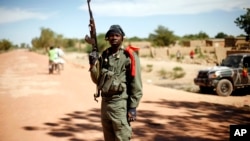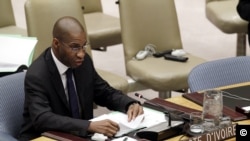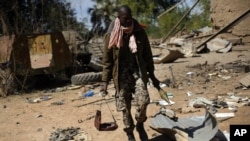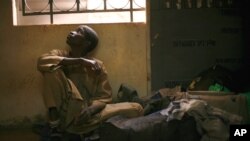U.N. officials say an African intervention force now deploying in Mali could double from its envisioned 3,300 troops, as more soldiers are needed to help regain control from Islamist militants holding the country's north.
Ivory Coast U.N. Ambassador Youssoufou Bamba, who represents the Economic Community of West African States at the United Nations, says nearly 1,000 troops already are in Mali. He urged the Security Council Tuesday to provide emergency financial and logistical support for the operation.
French and Malian forces have stopped a southward push by the militants, who seized the vast area of northern Mali following a March coup.
A VOA reporter in Gao says most Islamist militants have fled the city since last week, when French warplanes bombed their positions.
The reporter says that some militants have been spotted in the area - driving in trucks or riding motorbikes or hiding out in trees. But he adds it is clear the Islamists are not numerous or organized enough to continue applying the strict Sharia law they imposed after taking control of the city last April.
Local youths have taken up smoking again, the VOA reporter says, and girls without head coverings can be seen in the streets.
The journalist in Gao says the French airstrike on Gao 10 days ago did not kill any civilians, but that the city is suffering shortages of food and medical supplies because all deliveries from Niger and Algeria have been interrupted.
Gao has no communication links to the rest of the world. The reporter said he had to travel 180 kilometers outside Gao to file his report.
Malian forces are patrolling Diabaly, a town in central Mali where Islamist militants were beaten back Monday by French and Malian forces.
Residents in Diabaly, too, said the militants who formerly held power there either have fled or are attempting to blend in with civilians. The town is 400 kilometers north of the capital, Bamako.
The correspondent leading the VOA reporting team in Mali, Idrissa Fall, says calm also is returning to Douentza, a town militants had taken over in September.
Fall spoke Tuesday with residents who expressed relief that Malian forces and their allies are now in charge of local affairs.
"They confirmed that the Malian army, the French soldiers, they arrived yesterday [Monday] morning at 9:00 a.m. and the whole population in Douentza went out celebrating their arrival," said Fall.
French forces intervened in Mali January 11, when fears were growing that militants who still control much of northern Mali were pushing toward the capital. The United States has helped the French intervention force in Mali with transportation and equipment.
Pentagon spokesman George Little Tuesday said the U.S. military has flown five C-17 cargo flights into Bamako.
United Nations Secretary-General Ban Ki-moon says the terrorist threat in Mali has "global repercussions." In a speech to the General Assembly Tuesday, Mr. Ban said that addressing the unrest in Mali and the Sahel region is one of his top priorities this year.
During the past few days, the secretary-general said, he dispatched an advance team of U.N. multidisciplinary officials to Bamako as part of U.N. efforts to help stabilize Mali.
"My special representative for West Africa has been in close dialogue with the Malian authorities and our regional partners. Our humanitarian agencies are working to meet the growing needs of a crisis that has forced 350,000 people to flee their homes," he said.
Ban said the U.N. will work with its African and international partners to fully restore Mali's constitutional order and territorial integrity.
Ivory Coast U.N. Ambassador Youssoufou Bamba, who represents the Economic Community of West African States at the United Nations, says nearly 1,000 troops already are in Mali. He urged the Security Council Tuesday to provide emergency financial and logistical support for the operation.
French and Malian forces have stopped a southward push by the militants, who seized the vast area of northern Mali following a March coup.
A VOA reporter in Gao says most Islamist militants have fled the city since last week, when French warplanes bombed their positions.
Foreign Troop Commitments to Mali
Foreign Troop Commitments to Mali- France 2,000 on the ground, 500 more committed
- Chad to send 2,000
- Nigeria to send 1,200
- Benin to send 650
- Burkina Faso, Niger, Senegal, Togo have committed 500 each
- Guinea and Ghana are also sending troops
Local youths have taken up smoking again, the VOA reporter says, and girls without head coverings can be seen in the streets.
The journalist in Gao says the French airstrike on Gao 10 days ago did not kill any civilians, but that the city is suffering shortages of food and medical supplies because all deliveries from Niger and Algeria have been interrupted.
Gao has no communication links to the rest of the world. The reporter said he had to travel 180 kilometers outside Gao to file his report.
Malian forces are patrolling Diabaly, a town in central Mali where Islamist militants were beaten back Monday by French and Malian forces.
Residents in Diabaly, too, said the militants who formerly held power there either have fled or are attempting to blend in with civilians. The town is 400 kilometers north of the capital, Bamako.
The correspondent leading the VOA reporting team in Mali, Idrissa Fall, says calm also is returning to Douentza, a town militants had taken over in September.
Fall spoke Tuesday with residents who expressed relief that Malian forces and their allies are now in charge of local affairs.
"They confirmed that the Malian army, the French soldiers, they arrived yesterday [Monday] morning at 9:00 a.m. and the whole population in Douentza went out celebrating their arrival," said Fall.
French forces intervened in Mali January 11, when fears were growing that militants who still control much of northern Mali were pushing toward the capital. The United States has helped the French intervention force in Mali with transportation and equipment.
Pentagon spokesman George Little Tuesday said the U.S. military has flown five C-17 cargo flights into Bamako.
United Nations Secretary-General Ban Ki-moon says the terrorist threat in Mali has "global repercussions." In a speech to the General Assembly Tuesday, Mr. Ban said that addressing the unrest in Mali and the Sahel region is one of his top priorities this year.
During the past few days, the secretary-general said, he dispatched an advance team of U.N. multidisciplinary officials to Bamako as part of U.N. efforts to help stabilize Mali.
"My special representative for West Africa has been in close dialogue with the Malian authorities and our regional partners. Our humanitarian agencies are working to meet the growing needs of a crisis that has forced 350,000 people to flee their homes," he said.
Ban said the U.N. will work with its African and international partners to fully restore Mali's constitutional order and territorial integrity.









